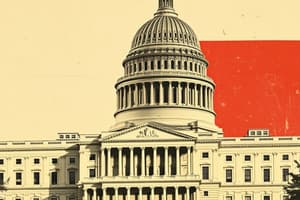Podcast
Questions and Answers
What is the primary function of 'authorization' in the context of Congress's fiscal responsibilities?
What is the primary function of 'authorization' in the context of Congress's fiscal responsibilities?
- To specify the exact funding level for already authorized programs and agencies.
- To monitor the federal debt.
- To establish or renew federal programs, agencies, policies, and other various projects. (correct)
- To enact major legislation addressing broad concerns of the government and citizens.
Which statement accurately describes the relationship between authorizations and appropriations?
Which statement accurately describes the relationship between authorizations and appropriations?
- Authorizations and appropriations are synonymous and used interchangeably in budgetary legislation.
- Authorizations specify funding levels, while appropriations establish or renew programs.
- Appropriations precede authorizations in the legislative process.
- Appropriations grant agencies the authority to incur obligations and make payments, subsequent to authorization. (correct)
What is a key reason Congress might choose not to reauthorize a program on time?
What is a key reason Congress might choose not to reauthorize a program on time?
- To streamline the budgetary process and reduce legislative workload.
- To avoid potential controversy associated with the program or the agency responsible for it. (correct)
- To allow the program to operate with greater flexibility and less oversight.
- To ensure that the program receives increased funding automatically.
What role does the Congressional Budget Office (CBO) play in the congressional budget process?
What role does the Congressional Budget Office (CBO) play in the congressional budget process?
What distinguishes a concurrent budget resolution from other forms of legislation?
What distinguishes a concurrent budget resolution from other forms of legislation?
According to the U.S. Constitution, which body has the primary authority to originate revenue bills?
According to the U.S. Constitution, which body has the primary authority to originate revenue bills?
According to Senate and House rules, what is generally required before a program or agency can receive appropriations?
According to Senate and House rules, what is generally required before a program or agency can receive appropriations?
In the context of the lawmaking process, what is the role of a conference committee?
In the context of the lawmaking process, what is the role of a conference committee?
What does Mayhew's research suggest about legislative output under divided government compared to unified government?
What does Mayhew's research suggest about legislative output under divided government compared to unified government?
Which of the following is considered a measure of individual lawmaker effectiveness?
Which of the following is considered a measure of individual lawmaker effectiveness?
Which inherent or acquired trait tends to lead to legislative success for a lawmaker?
Which inherent or acquired trait tends to lead to legislative success for a lawmaker?
What is the significance of the 'Appropriations Clause' in the U.S. Constitution?
What is the significance of the 'Appropriations Clause' in the U.S. Constitution?
Why are appropriations acts essential each year?
Why are appropriations acts essential each year?
Which type of spending comprises the majority of the federal budget?
Which type of spending comprises the majority of the federal budget?
What happens if both chambers of Congress pass a bill, but the President vetoes it?
What happens if both chambers of Congress pass a bill, but the President vetoes it?
Flashcards
Evaluate Congress
Evaluate Congress
The effectiveness of Congress's governing responsibility from a macro level.
Explore Congress
Explore Congress
The effectiveness of individual senators and representatives in terms of participating in the lawmaking process and representing their constituents
Congressional Activities
Congressional Activities
Congress must perform these activities to keep the government operating and to meet its own fiscal and statutory obligations.
Authorizations
Authorizations
Signup and view all the flashcards
Appropriations Legislation
Appropriations Legislation
Signup and view all the flashcards
Authorization Duration
Authorization Duration
Signup and view all the flashcards
Why Congress Doesn't Reauthorize
Why Congress Doesn't Reauthorize
Signup and view all the flashcards
The Budget
The Budget
Signup and view all the flashcards
Budget Resolution Timing
Budget Resolution Timing
Signup and view all the flashcards
Appropriations Acts
Appropriations Acts
Signup and view all the flashcards
Congressional Power of the Purse
Congressional Power of the Purse
Signup and view all the flashcards
House Authority over Revenue
House Authority over Revenue
Signup and view all the flashcards
Lawmakers' Responsiveness
Lawmakers' Responsiveness
Signup and view all the flashcards
Measures of Effectiveness
Measures of Effectiveness
Signup and view all the flashcards
Legislative Success Traits
Legislative Success Traits
Signup and view all the flashcards
Study Notes
- The chapter discusses the legislative effectiveness of Congress and its members in governing, policy making, and the budget.
- It aims to evaluate Congress's governing responsibility from a macro level and explore the effectiveness of individual senators and representatives in lawmaking and constituent representation.
Institutional Effectiveness
- Institutional effectiveness is based on lawmaking, oversight (Chapter 4), and constituent service (Chapter 10).
- Congress must perform activities to keep the government operating and meet its fiscal and statutory obligations.
- These activities include authorizations, annual budgets and appropriations, monitoring the federal debt, and enacting major legislation.
Authorizations
- Authorizations involve establishing or renewing federal programs, agencies, policies, and adjusting the purpose or mission of an existing program or agency.
- Appropriations legislation specifies the exact funding level of previously authorized programs and agencies.
- Appropriations grant agencies the authority to incur obligations and make payments of the federal treasury.
- Authorizations can be short-term or permanent, and their expiration date typically means an end to funding.
Budget and Appropriations Process
- Elements of the budget process include authorizing legislation, budget resolution, and appropriations legislation.
- A concurrent budget resolution does not require the president's signature and serves as a target cap on overall spending.
- The budget resolution doesn't always pass, and there's no real consequence for the budget being late
- Appropriations acts must be passed annually to fund federal departments, agencies, and government activities.
- Most of the budget is mandatory, including the national debt, contractual obligations, and entitlement spending.
- Appropriations are outlined in Article I, Section 9 of the Constitution.
- The House of Representatives has the constitutional authority to originate revenue bills and subcommittees consider appropriations bills.
- Individual appropriations bills are reported to the full Appropriations Committees, considered on the House and Senate Floors, and debated and adopted by the respective chambers.
- House and Senate conference committees reconcile differences, with members drawn from the Appropriations committees.
Congress’s Responsiveness
- Ways to examine Congress's responsiveness to the needs of society include the time members of Congress put into lawmaking, total bills enacted, and lawmakers' responsiveness to citizens.
- Congress’s time spent lawmaking can be measured in Days in session
- Mayhew's research examined whether divided government experiences fewer landmark enactments than unified government.
Individual Effectiveness
- Measures of individual effectiveness include bill sponsorship count in each term and the proportion of bills introduced that are enacted.
- Inherent and acquired traits of lawmakers that lead to legislative success include being a member of the majority party, ideology, tenure, specialization, committee leadership, number of staff, and natural ability.
- Senate is more responsive to the policy proposals of ideologically moderate lawmakers.
- Natural ability includes networking, hustle, hard work, luck, and the ability to read the political winds.
Studying That Suits You
Use AI to generate personalized quizzes and flashcards to suit your learning preferences.




